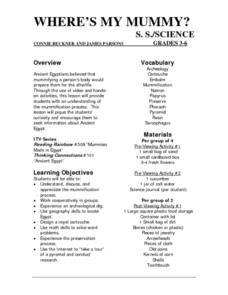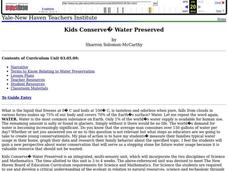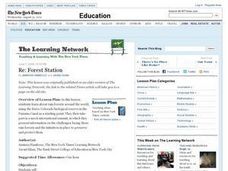Curated OER
Ghostbusting in the Chesapeake
Ghost pots, fishing gear lost during crabbing expeditions, continue to trap crabs that are never collected. Increase your budding ecologists' awareness of human impact on the environment as well as conservation efforts using this...
Curated OER
How Smart Growth Can Reshape Communities
Middle schoolers explore the concept of smart growth development. They create a class list highlighting the benefits of smart growth and then research, discuss, and present their findings on the benefits of smart growth and how it...
Curated OER
Importance and History of Ecological Conservation
Discuss and analyze a variety of information regarding the history of ecological conservation and preservation, as well as its importance. Scholars work in groups to complete four different activities, then report back to the class for a...
Curated OER
Where's My Mummy: Preservation Techniques
To observe preservation techniques firsthand, learners dry a flower in sand and compare cucumber slices soaked in salt water for a week with slices left out to dry in the open air. Video resources (not attached) include one about mummies...
Curated OER
History of Natural Resources in the U.S.
Students define conservation, exploitation and preservation, identify legislation related to conservation and environmental issues, and identify leaders and organizations that were key to the conservation and environmental movements.
Curated OER
Preserving Our Barns
Young scholars examine the different points of view when it comes to preserving barns. Using the internet, they work together to identify the risk involved in renovations and a barn in their local town that needs to be renovated. They...
Curated OER
Marine Animals: Stranded on the Coast
Students identify marine animals that could become stranded due to coastal features and currents. They plot data on worksheets for locations of sea turtles actually beached or stranded. After plotting their points, they hypothesize...
Curated OER
Kids Conserve? Water Preserved
Students study conservation and how cities obtain their water. In this water lesson plan students view a PowerPoint presentation and draw a picture of the water cycle.
Curated OER
Activist Survey
In this stewardship instructional activity, students determine what actions and behaviors help to keep an environment healthy. This instructional activity has 15 true or false questions.
Curated OER
Man's Struggle for Environmental Preservation
Students examine the way all living things are connected to one another. In groups, they participate in experiments in which they analyze the chemical processes through the biosphere and explain the role of energy. They also brainstorm...
Curated OER
Kids Conserve? Water Preserved
Sixth graders review the steps of the water cycle. Individually, they calculate the amount of water they use in a day and identify ways they can conserve. As a class, they discuss how conserving water today helps future generations and...
Curated OER
Protecting the Past: Give a Hoot, Don't Loot!
Young scholars, in small groups, simulate an ancient civilization and the art they created, another group represents vandals, and the final group represents archaeologists who try to figure out what life was like for the "ancient...
Curated OER
Pieces of the Past
Learners study the importance of preserving the archaeological record. They write a paragraph describing an object and why it is important to them. They cut their paper into a puzzle and compare their own to the student they trade with.
Curated OER
Harriman and Plant Identification
Students observe and record botanical details from the plant specimens. They identify plants using sorting key and field guide and classify specimens for preservation and display purposes.
Curated OER
TE Lesson: I've Got Issues!
Students study environmental issues from different perspectives. They look at the issues from the view of both preservationists and conservationists as they identify themselves with one group or the other. They determine how teamwork...
Curated OER
Environment: The River Classroom
Seventh graders engage in hands-on experiments and activities dealing with rivers and greenways. They also observe lectures and demonstrations by experts in water and river restoration. Students and teachers participate in canoe trips...
Curated OER
The Value of a Garden
Learners explore the history of taxonomy, the work of Carl Linnaeus, and the factors involved in the decline and extinction of a variety of botanical species.
Curated OER
Do Medicines Grow on Trees and Plants?
Students study the importance of preserving rainforest. They investigate the uses of rainforest plants for medicinal uses by participating in rainforest immersion activities.
Curated OER
Re: Forest Station
Students read an online article to explore rainforests of the world starting with the Barro Colorado reserve in the Panama Canal. They participate in a mock international summit about rainforest conservation issues.
Curated OER
Tourism and Preservation
Students explore the importance of preserving nature. In this science activity, students discuss why natural sites shouldn't be made into tourist destinations. Students write an agreement form supporting a solution to avoid overcrowding.
Curated OER
Tree-mendous!
Fifth graders identify the ways people use trees. In this Science lesson, 5th graders play a word game with tree classification. Students determine the need for protecting natural resources.
Curated OER
Countdown Calendar
Students create a calendar of endangered species. In this preservation lesson, students research endangered species of plants and animals around the Lake Pontchartrain Basin. Students gather facts about the endangered species and create...
Curated OER
One Kid Can Make A Difference
Students make a pledge to make three positive choices for 30 days and track their progress. In this positive choices lesson plan, students discuss ways in which they can be healthier, protect the environment, be respectful, and more....
Curated OER
Food Preservation
Students examine the variety of food preservation methods available today. In groups, they participate in an experiment to determine the conditions that encourage or stop the growth of bacteria. To end the lessons, they discuss the...

























